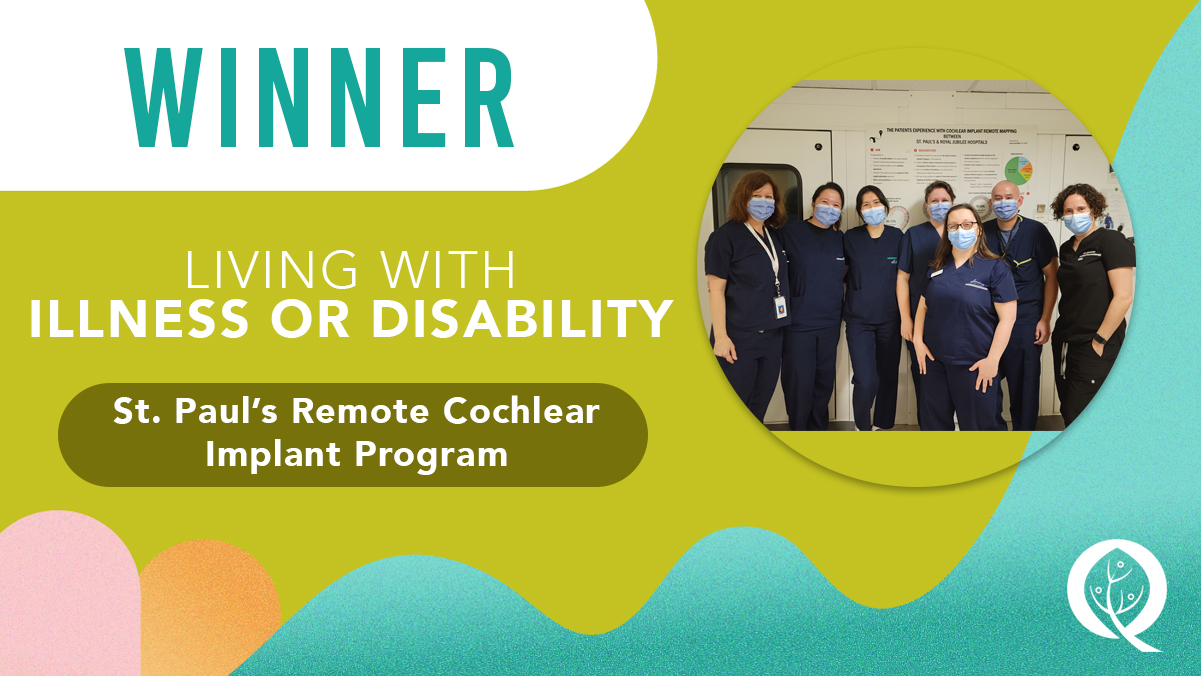- 2023
|
- Winner
|
- Living with Illness or Disability
The adult cochlear implant program at St. Paul’s Hospital in Vancouver serves more than 970 people with cochlear implants, an electronic device inserted into the organ of hearing, the cochlea, that helps to restore hearing.
Because it’s the only adult cochlear implant centre in the province, people who have this surgery traditionally have travelled back to St. Paul’s for follow-up appointments to activate the device and help with programming – also known as mapping – to optimize speech performance. Appointments occur four weeks after surgery, then at periodic intervals for the first year, and then annually for life.
However, a significant number of those 970 patients live outside of the Lower Mainland. This means they bear the added time and costs of travel, meals, gas, parking, hotel, time away from work and potentially ferry to access this care – and that was before COVID-19 added travel restrictions and flooding decimated the province’s highway network. Given that over half of cochlear implant patients are 65 years and older, the cost escalates as most cannot travel alone and need the support of family members or friends. And without the follow-up appointments, care and optimal use of the device can be compromised.
“Even before COVID-19, the team heard from patients that travel time and cost was a barrier for follow-up,” says Jowan Lee, an audiologist at St. Paul’s, who says there had already been discussions about how they could offer a remote virtual option for cochlear implant follow up – one of the first to offer remote programming services in Canada.
When COVID-19 hit, those discussions accelerated, and in December 2020 the team launched the Remote Cochlear Implant Program, enabling implant recipients to undergo mapping of the device through a virtual platform. Starting with Royal Jubilee Hospital in Victoria, and then Royal Inland Hospital in Kamloops, patients either no longer need to leave their home community for follow-up visits, or have a closer health care centre for their appointments, although the option is always open to travel to St. Paul’s.
It’s a partnership between information technology and virtual care teams from Providence Health, Provincial Health Services Authority, Island Health and Interior Health, and is accomplished through use of a network platform and a monitor, with audiologist and patient communicating via video feed. By using remote access technology, the audiologist is able to take control of the programming software on the hospital laptop, enabling the patient’s sound processor settings to be optimized.
The program is also creating greater access beyond travel, as it has allowed St. Paul’s to expand from two appointments per day to three.
The Remote Cochlear Implant Program has changed the patient experience for the better, as evidenced by feedback from those in Island Health and Interior Health.
Care providers have called the service seamless and the technology easy to use. Services at Royal Jubilee operate two days per month, and one day per month at Royal Inland.
“We are all working together on this supportive way for our clients to make their appointments. A lot of our patients weren’t getting it done for a variety of reasons – COVID-19, damaged highway system and also because they are too vulnerable to travel,” says Shawn Berglund, virtual care manager at Royal Inland Hospital.
Adds Royal Inland colleague Bill Demuth, a virtual are analyst: “Much of information technology is a supportive resource, but with virtual care, we impact patients in a positive way every day. These programs that make a direct difference for patients are the ones I especially like.”


